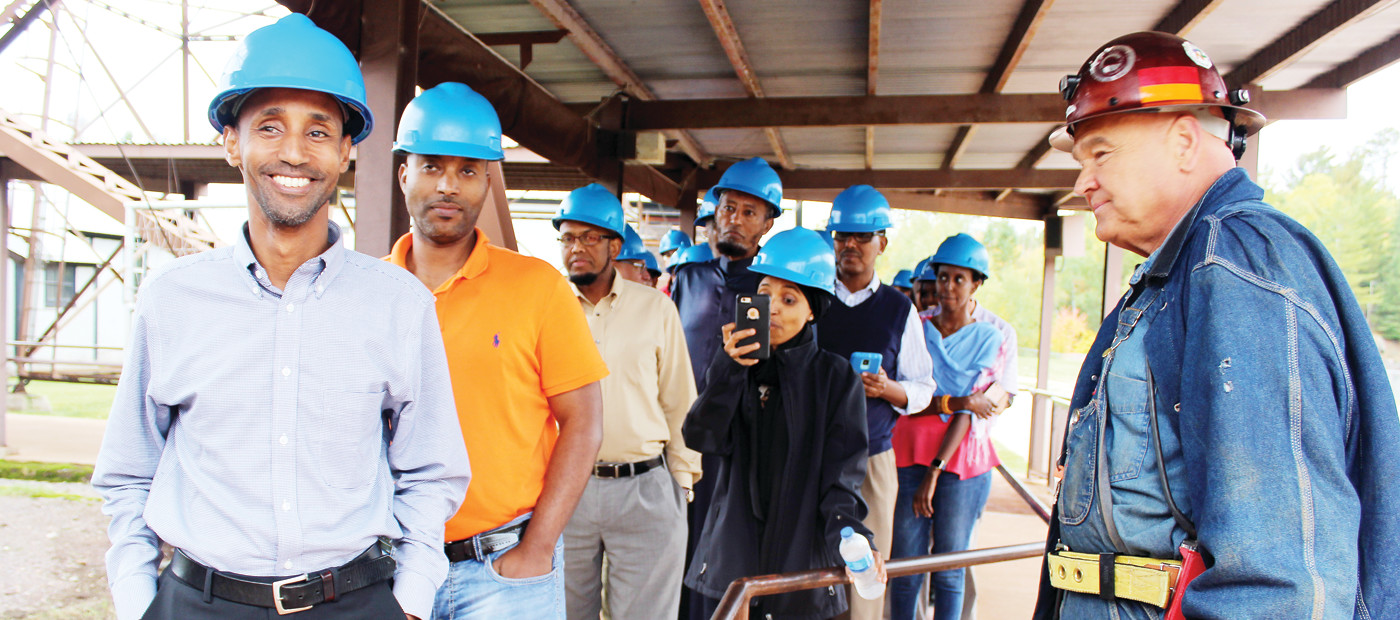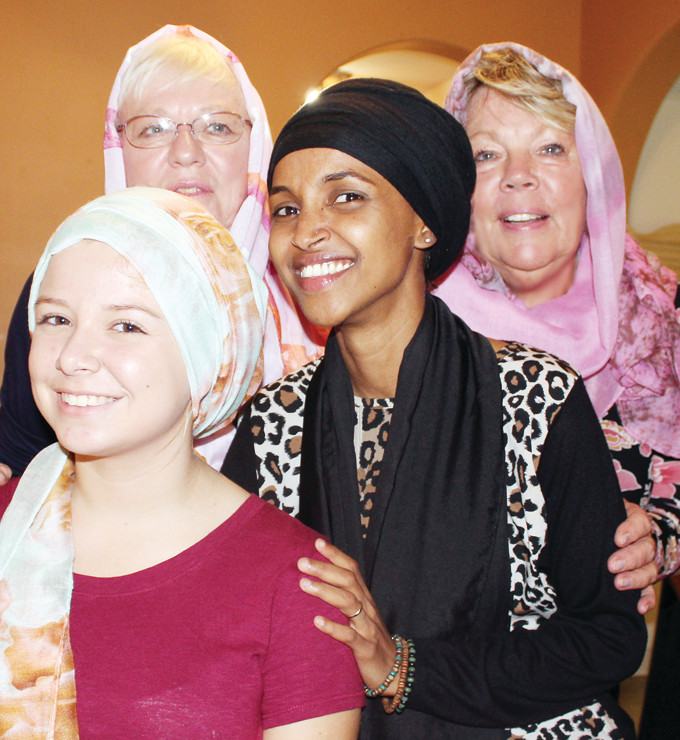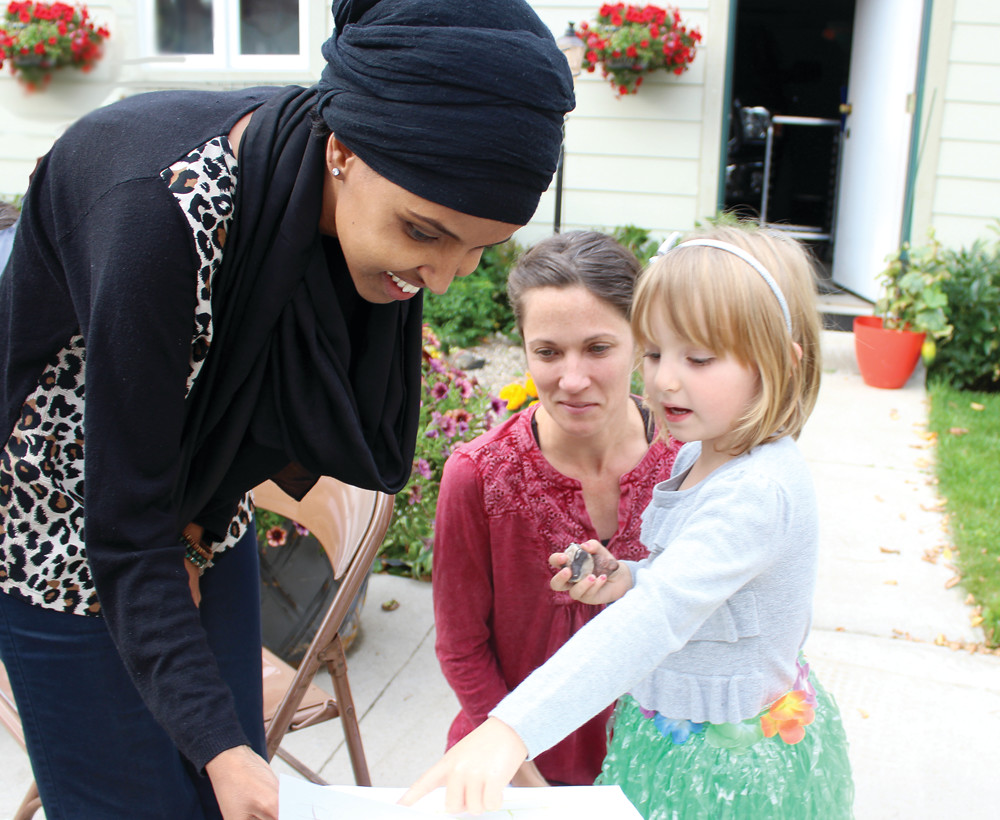Support the Timberjay by making a donation.
Breaking bread, breaking barriers
Somali group makes visit to the far north
TOWER- This was very likely the first time a person who was just featured on the cover of Time magazine made a visit to Tower-Soudan. But Rep. Ilhan Omar’s visit to this small town in northeastern Minnesota wasn’t about her own role as a ground-breaking Muslim-American politician, it was about building bridges and friendships between two immigrant communities, one new to this country and one much more established.
Earlier in September, Ilhan Omar was featured on the cover of Time magazine as one of 46 women who have broken barriers. Omar is the first Somali-American elected to state office. Born in Somalia, her family spent four years in refugee camps before moving to the United States, eventually settling in Minneapolis’s Cedar-Riverside neighborhood. She graduated from North Dakota State University with a degree in political science and international studies. She worked for the University of Minnesota and the Minnesota Department of Education, before becoming involved in politics.
In 2016, Omar was elected to represent House District 60B, which includes the Cedar-Riverside community near the University of Minnesota, after defeating 44-year incumbent Phyllis Kahn, and a Somali-American man, in the Democratic primary.
Omar was one of 18 Somalis and East African immigrants who visited Tower-Soudan on Saturday. Paul Winkelaar and Mike Van Keulen, who are friends with many of those who made the journey, helped organized the visit with help from the Islamic Civic Society of America, based in Minneapolis.
Post-Trump America
Paul Winkelaar, who grew up on the Iron Range, was upset, to put it mildly, with the election results in Minnesota last November.
“I was hot mad,” he said, “and really disappointed in how the election made my Somali friends feel.” Many in the immigrant and refugee community continue to worry about the anti-Muslim sentiment that Trump frequently inflames, and the realization that this attitude is starting to show itself in Minnesota. Paul vented his anger at his father, Karel, of Tower. Paul is an educator, and lobbyist, and has been politically active for most of his adult life. He had formed strong connections with friends and leaders in the Somali community, which has become a vibrant force in the professional, creative and social fabric of the Twin Cities.
The vote totals from the Iron Range surprised him. “What are your friends doing to my friends?” he asked his father.
Karel, who works as a guide in the Soudan Underground Mine, where he dresses and plays the part of an immigrant mineworker, is an immigrant himself. His family, with roots in Holland and Indonesia, fled from Europe during World War II.
Paul realized that his father, along with most of his Iron Range neighbors, did not have the opportunity to make friends with the East African immigrants who now call Minnesota home. He invited his father to celebrate at a special evening meal during Ramadan, an iftar, with members of the Somali community in the Twin Cities. After that experience, Karel decided to return the favor, and invited a group to venture far north, to tour some sites and share a meal with his neighbors in Tower-Soudan. This group of some of the state’s newest immigrants learned about the history of some of the state’s older immigrants, those who came to northern Minnesota to work in the iron mines in the 1880s.
The meal itself was a noisy event. Sharing food from Somalia and Indonesia, the “locals” and Somalis gathered in small groups, talking about family, jobs, their community, and the future. Emails and phone numbers were exchanged, contacts were made for future gatherings, and images were posted on Twitter and Facebook.
Building bridges
Many in this group of 18 Somali and East African immigrants, including professionals and community and religious leaders, had never been north of the Twin Cities. A few had ventured as far north as Duluth. But the journey as far north as Tower was a new experience for almost all of them.
What they knew about Tower before this day was one single fact. Tower was officially the coldest place in Minnesota. What they found, of course, was much more.
Omar, whose effervescent personality shone through the crowd, was eager to hear about the history, economy, and future of Tower-Soudan. A common thread was the importance of education and community, and the need to serve all Minnesotans, new and old, urban and rural.
“We are all Minnesotans,” she said. “We all want good and safe schools, jobs, and a healthy environment.”
Omar said her grandfather taught her that once you shared a meal with someone, you became instant friends. She talked about an initiative in the Twin Cities, where they have forged connections between the African-American communities and the new immigrants from East Africa by sharing meals. This first-time outreach to northern Minnesota was continuing the opportunity to build bridges.
“I am optimistic about the kind of community-building we are doing,” she said. “We are unified in our diversity.”
Rep. Rob Ecklund also joined the gathering. He joked it was hard to have to speak following after a star. He said this type of community-building was essential.
“When you break bread you form friends,” he said.
“If we can do this in Tower,” Ecklund said, “we can do it anywhere.”
Omar joked about the size of Rep. Rob Ecklund’s district, which stretches across northeastern Minnesota.
“I can’t complain about all our door-knocking,” she said, saying it was hard to imagine covering such a geographically-large area. Omar’s grass roots organizing, including lots of knocking on doors, had increased voter turnout in her district by over 35 percent.
Abdisalam Adam, a board member from the Islamic Civic Society of America (ISCA), talked about the Islamic faith of the Somali community.
“We are all servants of God,” he said. “We are all from different tribes. Speak to your friends and tell them about Muslims. This is the best way to address fears.”
He laughed about the experience of going a half-mile underground into the Soudan Mine.
“We were all tight together in the cage in the dark,” he said. “I didn’t know if we needed to start reciting from the Quran…but we did come back up!”
Adam noted that his ancestors were nomads in the desert, and said many ask why so many Somalis settled in the cold north.
The reason, he said, had to do with the hospitality, and the heart, of Minnesotans.
Omar echoed this fact.
"We came to Minnesota because you have warm hearts,” she said.
But now, Adam noted, Muslim communities in Minnesota have come under threat.
“We need your help, your defense,” he said. “You have shown us the best way to integrate and to face that challenge.”
“Our community is dynamic, entrepreneurial, and creative,” he said. “We will not disappoint you.”
Adam, who has been in Minnesota for 26 years, sat next to Tower resident Mary Shedd, whose family can count 14 generations in this country.
“This is the continuation of that journey,” he said. ICSA works to create a more civic and democratic society, along with respecting Muslim faith and ideals.
Karel Winkelaar welcomed everyone into the Tower-Soudan community.
“It really makes my heart feel good,” he said. “We are all speaking to each other. I have learned to love each and every one of you. This is my home, and now it is your home, too.”
Ilhan Omar
Omar’s life has been filled with travel and international appearances since her election last November. With three school-age children, she keeps busy with her children’s school-related activities, including waking up early on this Saturday to bring her oldest daughter to a high school debate tournament.
Omar said her political beliefs were influenced by her father, who is a strong believer in democracy. Her father also lives in the Cedar-Riverside area.
“It is still hard to believe that a Muslim, who is visibly Muslim,” she said, “was elected.” Omar wears the traditional headscarf. Unlike Keith Ellison, the U.S. Rep. from Minneapolis who is a Muslim, Omar noted that not only was she a Muslim, but she was a woman from a culture that was not used to women in politics, and she had a foreign, not American, name.
The fact that Omar had made the trip to Tower-Soudan made an impression on the locals.
“She had one thousand reasons to blow us off,” said Mike Van Keulen, who had helped arrange the trip with Paul. Just in the past week, she had visited New York City, where she met with Turkey’s controversial President Erdogan. She had been invited by the Turkish consulate in Chicago, and the meeting focused on Turkish/Muslim relationships, and how to be a better advocate for Somalia. “I have challenged other Muslim leaders on human rights issues,” she said, “for the rights of women and minorities, and for political freedoms.”
In Tower, her job was much easier. She put a face, smiling, laughing and joyful, on the picture of what is a Muslim in Minnesota.
The Somalis, before leaving for their trip back to Minneapolis, gave gifts of traditional head scarfs and men’s sarongs for the crew at Sulu’s who had been instrumental in organizing the time in Tower-Soudan.
Somalis in Minnesota
Over 40,000 Somali immigrants have made Minnesota their home since the early 1990s. Most have settled in immigrant neighborhoods in and around Minneapolis, though some have settled elsewhere, mostly in agricultural areas in the southern and northwestern parts of the state, where workers are needed for processing plants.
This outreach effort was organized with the help of leaders from the Islamic Civic Sociey of America (www.icsaweb.org).
From the group’s website:
In early 1993, the East African community started to come to Minnesota to flee the wars in their homelands and to find a better life for them and their families. In June 1998, a group of scholars and community leaders became aware of the need for community space. As many immigrants have done in the past, these scholars and leaders yearned for a place to preserve the community’s identity, culture, religion, and values. They established the first phase of the Islamic Civic Society of America (Dar Al-Hijrah Mosque) in the heart of the West Bank in the Cedar-Riverside neighborhood.
The Islamic Civic Society of America (ICSA) demonstrates the compatibility between Islamic and civic principles in a democratic society. Members of ICSA are dedicated to governing for the common good while addressing the specific needs of the Muslim community. The Islamic Civic Society of America’s Operating Principles guide members in their commitment to advance ICSA identity while achieving goals.
The purpose of ICSA is to develop the civic capacity and civic infrastructure needed to advance our Islamic and democratic identity in each generation while achieving goals. The outcome contributes to producing a more just society.
Read Ilhan Omar’s essay from the Sept. 17 Time magazine issue at http://time.com/collection/firsts/4898550/ilhan-omar-firsts/











